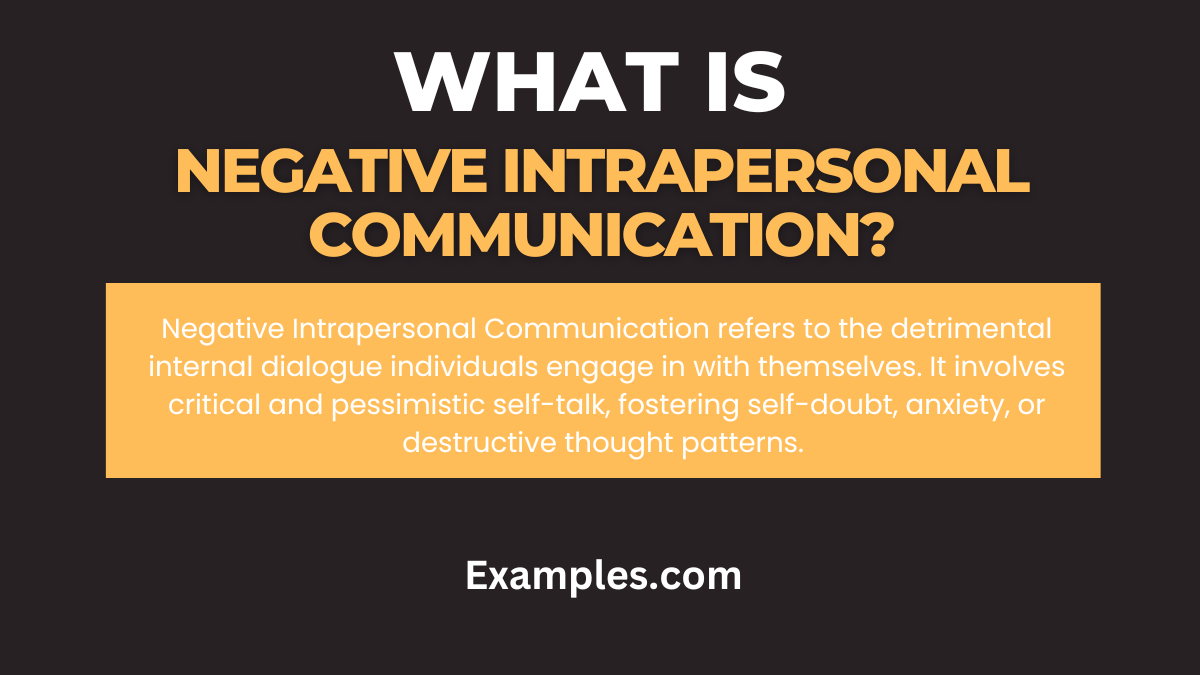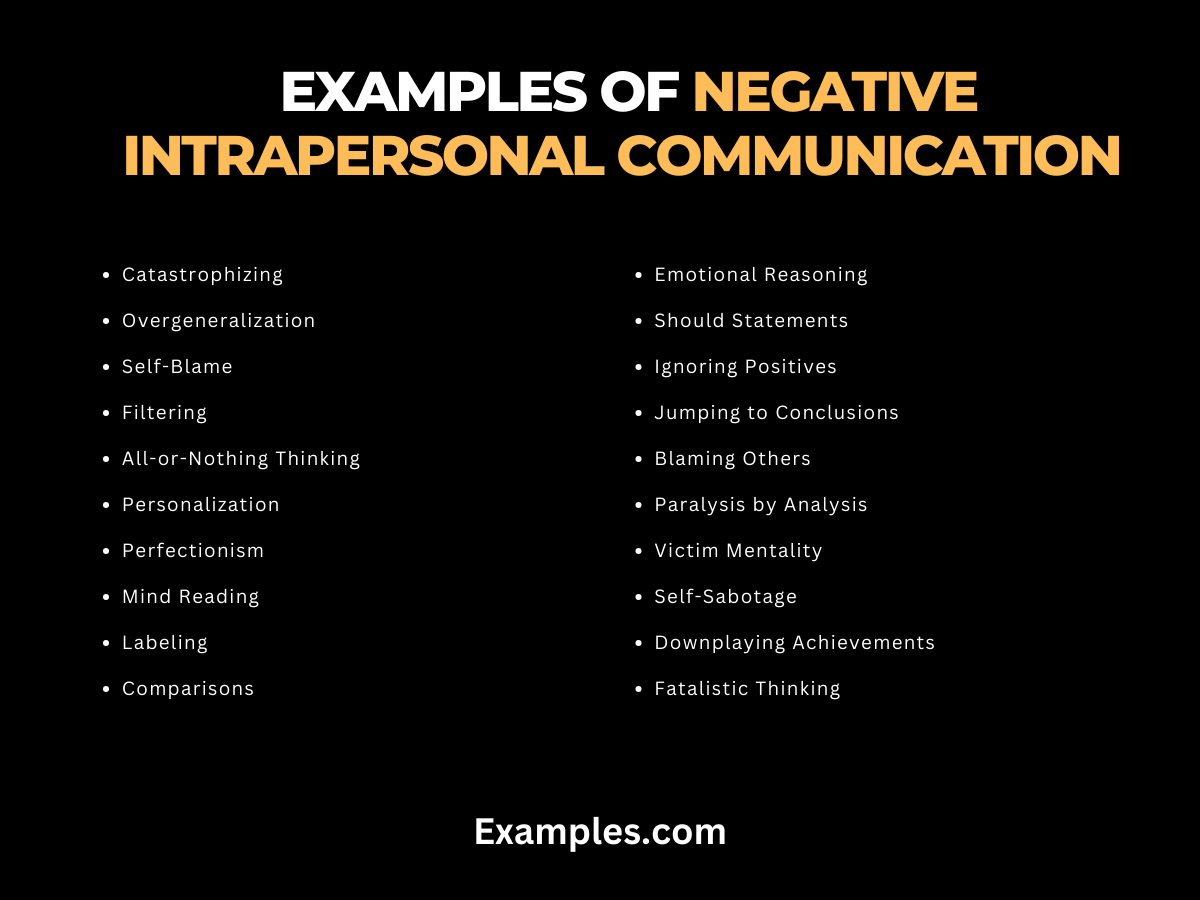19+ Negative Intrapersonal Communication Examples
Negative Intrapersonal Communication unveils the intricacies of self-dialogue, exploring its definition, historical context, and origins. Delve into tangible examples, unlocking the roots of detrimental internal conversations. Navigate practical tips and effective techniques on how to shift towards healthier self-talk. This comprehensive guide not only deciphers the concept but also provides actionable insights to transform negative intrapersonal communication into a catalyst for personal growth and positive change.
What is Negative Intrapersonal Communication?

Negative Intrapersonal Communication refers to the detrimental internal dialogue individuals engage in with themselves. It involves critical and pessimistic self-talk, fostering self-doubt, anxiety, or destructive thought patterns. This phenomenon can significantly impact one’s mental well-being, influencing emotions, behaviors, and overall self-perception. Understanding and addressing negative intrapersonal communication is crucial for fostering a positive mindset and promoting mental resilience.
20 Examples of Negative Intrapersonal Communication

Negativity in intrapersonal communication manifests in self-defeating thoughts and harmful internal dialogues.
1. Catastrophizing: Magnifying the worst possible outcomes, causing unnecessary stress.
2. Overgeneralization: Drawing broad negative conclusions based on isolated incidents, hindering a balanced perspective.
3. Self-Blame: Unfairly assigning fault to oneself, contributing to feelings of guilt and inadequacy.
4. Filtering: Focusing solely on negative aspects, distorting perceptions and eroding optimism.
5. All-or-Nothing Thinking: Viewing situations in extreme, black-and-white terms, limiting nuanced understanding.
6. Personalization: Taking undue responsibility for external events, leading to unwarranted guilt or shame.
7. Perfectionism: Demanding flawless performance, setting unrealistic standards that breed anxiety.
8. Mind Reading: Assuming negative thoughts or judgments from others without concrete evidence, fueling insecurity.
9. Labeling: Assigning negative labels to oneself based on past mistakes, perpetuating a negative self-image.
10. Comparisons: Measuring personal worth against others, fostering envy and undermining self-esteem.
11. Emotional Reasoning: Letting emotions dictate reality, allowing fleeting feelings to distort perspectives.
12. Should Statements: Imposing rigid expectations on oneself, creating undue pressure and stress.
13. Ignoring Positives: Disregarding positive aspects, reinforcing a pessimistic mindset.
14. Jumping to Conclusions: Forming negative conclusions without sufficient evidence, leading to unwarranted anxiety.
15. Blaming Others: Avoiding personal responsibility by shifting blame, hindering personal growth.
16. Paralysis by Analysis: Overthinking and excessive self-reflection, impeding decision-making.
17. Victim Mentality: Adopting a passive role, feeling powerless in the face of challenges.
18. Self-Sabotage: Engaging in behaviors that undermine personal success, often driven by fear.
19. Downplaying Achievements: Minimizing accomplishments, downplaying personal victories.
20. Fatalistic Thinking: Believing outcomes are predetermined, stifling motivation for positive change.
Negative Intrapersonal Communication at Work

In the workplace, negative intrapersonal communication can significantly impact individual performance and overall team dynamics. Recognizing and addressing these challenges is crucial for personal and professional growth.
1. Understanding Negative Intrapersonal Communication:
- Explore the concept of negative intrapersonal communication and its manifestations in the workplace.
- Recognize the impact of internal dialogues on emotions, behaviors, and job satisfaction.
2. Common Negative Patterns:
- Identify prevalent negative thinking patterns that hinder effective communication skills.
- Discuss how catastrophizing, self-blame, and overgeneralization can adversely affect work dynamics.
3. Impact on Work Performance:
- Analyze the correlation between negative intrapersonal communication and job-related stress.
- Explore how these patterns can impede decision-making, problem-solving, and overall productivity.
4. Overcoming Negative Self-Talk:
- Provide practical strategies to combat negative self-talk and foster a positive mindset.
- Offer mindfulness techniques and cognitive reframing exercises to enhance self-awareness.
5. Developing Positive Communication Skills:
- Emphasize the importance of cultivating strong communication skills at the individual and team levels.
- Provide actionable tips for effective self-expression, active listening, and conflict resolution.
6. Creating a Supportive Work Environment:
- Discuss the role of organizational culture in influencing intrapersonal communication.
- Propose strategies for fostering a workplace environment that encourages open dialogue and collaboration.
7. Building Emotional Intelligence:
- Highlight the connection between emotional intelligence and intrapersonal communication.
- Offer exercises and practices to enhance emotional intelligence for improved workplace interactions.
8. Seeking Professional Development:
- Encourage continuous learning and professional development opportunities.
- Showcase the benefits of workshops, training sessions, and coaching to refine communication skills.
9. Encouraging Feedback and Reflection:
- Promote a culture of constructive feedback and self-reflection.
- Guide individuals in leveraging feedback for personal growth and improved communication.
10. Case Studies and Success Stories:
- Share real-world examples of individuals overcoming negative intrapersonal communication challenges.
- Illustrate how improved communication skills positively impact career trajectories and job satisfaction.
Negative Intrapersonal Communication In Everyday Life
Negative intrapersonal communication in everyday life can significantly impact mental well-being and interpersonal relationships. Explore the various dimensions of this phenomenon and gain insights into recognizing, addressing, and transforming these harmful patterns.
- Understanding Negative Intrapersonal Communication Delve into the roots of negative intrapersonal communication, exploring how self-talk and internal dialogues shape perceptions and emotions in daily life.
- Common Patterns and Thought Distortions Identify prevalent negative thinking patterns, such as catastrophizing, overgeneralization, and all-or-nothing thinking, unraveling how these distortions impact daily interactions.
- Effects on Emotional Well-being Examine the emotional toll of negative intrapersonal communication, understanding its influence on stress, anxiety, and overall mental health in various life situations.
- Recognizing Negative Intrapersonal Communication Develop awareness of negative self-talk by recognizing the subtle cues and triggers that perpetuate harmful communication patterns in everyday experiences.
- Impact on Interpersonal Relationships Explore the ripple effects of negative intrapersonal communication on relationships, discovering how internal negativity can manifest in external behaviors and interactions.
- Breaking the Cycle: Strategies for Transformation Discover practical strategies to break free from negative intrapersonal communication habits, including mindfulness, cognitive restructuring, and positive affirmations.
- Cultivating Positive Intrapersonal Communication Skills Learn how to foster positive self-talk and cultivate effective intrapersonal communication skills, promoting resilience, self-esteem, and a healthier mindset.
- Daily Practices for Improved Intrapersonal Communication Explore daily practices and habits that contribute to positive intrapersonal communication, creating a foundation for improved mental well-being and communication skills.
- Seeking Professional Support Recognize when negative intrapersonal communication requires professional intervention and explore avenues for seeking therapeutic support and guidance.
- Building a Positive Communicative Mindset Understand the connection between positive intrapersonal communication and enhanced overall communication skills, unlocking personal growth and success in various life domains.
What Is A Negative Interpersonal Communication In Relationships?
Negative interpersonal communication in relationships refers to the detrimental ways individuals interact, impacting the quality and health of their connections. Recognizing and addressing these challenges is crucial for fostering understanding and creating a more positive relational environment.
Common Forms of Negative Communication:
- Criticism: Offering harsh judgments and disapproval.
- Contempt: Displaying disdain or disrespect towards the partner.
- Defensiveness: Avoiding accountability and shifting blame.
- Stonewalling: Withdrawing and avoiding communication altogether.
Impact on Relationships: Negative interpersonal communication can erode the foundation of a relationship. It fosters resentment, creates emotional distance, and diminishes overall satisfaction. Over time, it may lead to increased conflict, decreased intimacy, and, in severe cases, relationship breakdown.
Causes and Triggers: Understanding the root causes and triggers of negative communication is essential. Factors such as stress, unmet needs, past traumas, or incompatible communication styles contribute to its emergence.
Breaking the Cycle:
- Self-Awareness: Recognizing and acknowledging negative communication patterns.
- Active Listening: Cultivating empathetic listening skills to understand the partner’s perspective.
- Constructive Feedback: Expressing concerns or needs in a constructive, non-blaming manner.
- Emotional Regulation: Developing strategies to manage emotions during disagreements.
- Seeking Professional Help: Consulting a therapist for guidance in navigating communication challenges.
Building Positive Communication Skills:
- Effective Expression: Learning to communicate needs, feelings, and expectations clearly.
- Empathy: Understanding and validating the partner’s emotions.
- Conflict Resolution: Employing healthy strategies to address and resolve conflicts.
- Non-Verbal Communication: Recognizing the impact of body language and gestures.
- Validation: Acknowledging and respecting the partner’s viewpoint.
Nurturing Healthy Relationships: Positive communication is fundamental to building and sustaining healthy relationships. Cultivating open, respectful, and supportive communication fosters a strong foundation and strengthens emotional bonds.
Navigating Challenges Together: By addressing negative communication patterns and actively working towards positive change, individuals can enhance their relational dynamics, promoting understanding, connection, and long-term satisfaction.
How To Manage Negative Emotions For Interpersonal Communication?
Negative emotions can disrupt effective interpersonal communication. Acknowledging and understanding these emotions is crucial.
Self-Awareness and Emotional Regulation
- Identify Triggers: Recognize what provokes negative emotions during communication.
- Emotional Awareness: Acknowledge your emotions without judgment, understanding their impact.
- Emotional Regulation: Employ techniques like deep breathing or mindfulness to manage emotions.
Constructive Responses in Communication
- Pause and Reflect: Take a moment to gather thoughts before responding impulsively.
- Express Constructively: Communicate feelings using “I” statements, focusing on your emotions rather than blame.
- Active Listening: Practice attentive listening to understand others’ emotions better.
Conflict Resolution Techniques
- Seek Clarification: Clarify any misunderstandings before assuming negative intentions.
- Focus on Solutions: Shift conversations toward finding resolutions rather than dwelling on issues.
- Empathy Building: Understand others’ perspectives to find common ground.
Establishing Boundaries and Self-Care
- Setting Boundaries: Communicate personal boundaries effectively during interactions.
- Prioritize Self-Care: Maintain mental and emotional well-being outside communication instances.
- Seek Support: Reach out to mentors or professionals for guidance in managing emotions.
Continued Practice and Growth
- Continuous Learning: Embrace opportunities to improve emotional intelligence and communication skills.
- Reflective Journaling: Keep a journal to track emotional patterns and improvements.
- Feedback Acceptance: Be open to feedback; it’s crucial for self-awareness and growth.
In conclusion, recognizing and addressing negative intrapersonal communication is pivotal for fostering a healthier work environment. By understanding common patterns, overcoming self-talk, and developing positive communication skills, individuals can enhance job satisfaction and overall workplace dynamics. Embracing continuous learning, feedback, and emotional intelligence is key to personal growth and success in navigating professional challenges.



